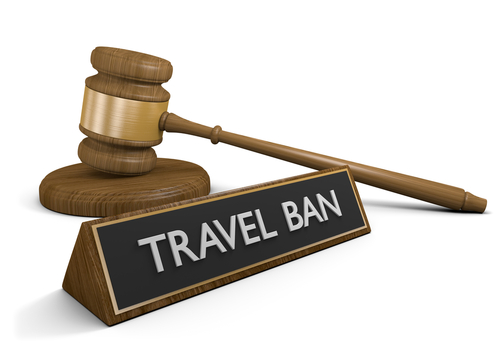Trump administration to SCOTUS: Temporary travel ban is not based on religion

Shutterstock.com
The federal government says statements made by Donald Trump during his campaign should not be considered as the U.S. Supreme Court decides whether the president’s temporary travel ban is constitutional.
According to Reuters and The Hill, the Trump administration filed an 84-page brief with the Supreme Court late on Thursday, defending the president’s executive order banning entry into the United States by citizens of six Muslim-majority nations in the Middle East and Africa. The order also forbids admission of more than 50,000 refugees, a cap that has already been reached. It’s being challenged by the state of Hawaii and by the International Refugee Assistance Commission, whose cases have been consolidated before the high court and are set for oral argument Oct. 10.
The challengers have argued that the executive order discriminates against Muslims. Among other evidence, they have cited statements by Trump on the campaign trail, such as a promise to make “a total and complete shutdown of Muslims entering the United States.” District courts and two federal appeals courts have taken those statements into consideration when ruling against the government.
But in its latest brief, the Department of Justice pushes back against the idea that courts should consider those statements. The Hill reported that the brief says the executive order “is not a so-called ‘Muslim ban’ and campaign statements cannot change that basic fact.” Attorneys for the government wrote that campaign statements are “often made without the benefit of advice from an as-yet-unformed administration,” and shouldn’t be binding on candidates who change their minds when they take office.
The administration also argued that the president has power to bar entry of foreign nationals he deems “detrimental to the interests of the United States.” Trump didn’t decide that all nationals of the six countries affected by the ban are terrorists, the brief says; he decided that their governments are unable to provide enough information to rule any of them out as terrorists or evaluate “their propensity to commit terrorism.”
The brief came one day after a shorter brief from the Department of Justice in the same case, but before the San Francisco-based 9th U.S. Circuit Court of Appeals, as Law360 (sub. req.) reported. That court is considering whether to limit or expand the scope of a stay on the ban that permits travel into the U.S. by certain people with “a credible claim of a bona fide relationship” with someone in the country.
But a Hawaii district judge has construed the required relationship with someone in the U.S. broadly to include more categories of relative than the Trump administration initially permitted. The Supreme Court let that stand in July. Oral arguments in that case are set for Aug. 28 in Seattle.
Updated at 5:50 p.m. to correct reference to U.S. Supreme Court.



